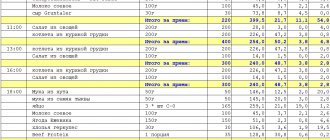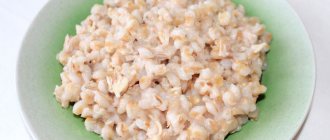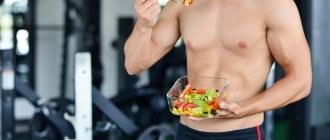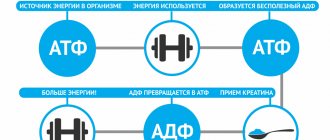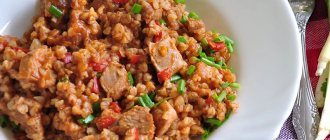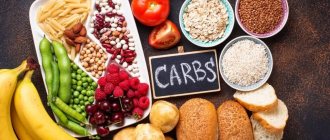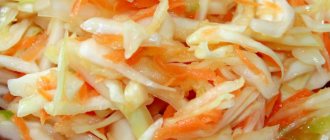Having set foot on the path of sports, you will have to face the solution of important problems, because without this it is impossible to create a beautiful, toned body with pronounced muscle relief. First of all, you need to assess your physical fitness and create a training program. Overweight people should devote more time to aerobic exercise: running, swimming, jumping rope. In other cases, if you have normal weight or lack mass, you can safely lean on strength exercises.
The most important task for a novice athlete is creating a menu. Nutrition plays a vital role on the path to creating a beautiful body. The ratio of BJU (proteins, fats, carbohydrates) affects the rate of muscle mass gain and the final result. By changing it, you can easily lose weight or gain muscle in a short time.
Basics of a sports diet
Although protein foods are indeed the cornerstone of sports nutrition for muscle building, reducing the entire diet to calculating the daily protein intake would be completely wrong. Human metabolism is quite complex, and therefore focusing on one element only leads to physiological dysfunctions and disorders.
When creating a nutrition schedule, an athlete has to look for a balance in daily consumption of all components of a healthy diet.
Protein
In approximate terms, an athlete needs to consume about 2 grams of protein per kilogram of weight to ensure a stable increase in muscle mass. However, it should be noted that such advice is akin to measuring the average temperature in a hospital, since much depends on gender, age, intensity and type of activity, etc.
In general, when training to build muscle, protein in the diet should be about 25-30%, but no more, so as not to provoke gastrointestinal dysfunction, the development of autoimmune diseases or enzymatic liver disorders - characteristic consequences of an excess of protein in the body.
Fats
It is recommended that fat in the diet be at least 20%, but this issue also has its own nuances. On the one hand, a lack of fat leads to a disruption in the absorption of fat-soluble vitamins (A, D, E, K), as a result of which the entire metabolism suffers - and the full absorption of protein in particular. In addition, with a deficiency of fat, hormonal synthesis and cellular regeneration are disrupted, and the “wear and tear” of joints is accelerated.
On the other hand, there is an opinion that saturated fatty acids interfere with the gain of muscle mass, and therefore athletes need to consume only certain types of fat-containing foods, and strictly balance animal and plant fats.
Carbohydrates
Carbohydrates, as the main source of energy intensively “burned” during training, should make up about 50-60% of the diet - but these figures are also approximate and should be adjusted individually.
Calcium
Adequate amounts of calcium during strength training are necessary for three reasons:
- to regulate muscle contractions (including cardiac ones) and prevent a decrease in strength indicators;
- to compensate for the increased consumption of calcium observed under any stress, including intense physical activity;
- in order to prevent disturbances in the synthesis of hormones and neurotransmitters.
It is important to consider that an overdose of calcium leads to muscle cramps, cardiac arrhythmia, cholelithiasis and urolithiasis, arthritis and other dangerous disorders. Therefore, increasing your calcium intake needs to be done very delicately.
Vitamins and minerals
We should not forget that for complete absorption of protein in the body there must be a sufficient amount of vitamins C, B3 (PP), B6, B9 (folic acid) and D, as well as zinc (Zn) and iron (Fe).
At the same time, any vitamin and mineral imbalance inevitably leads to metabolic disorders and, as a result, a slowdown in muscle mass growth - not to mention health problems.
Meal schedule
The most difficult part of the diet program for gaining muscle mass. Depending on the characteristics of your training, you may need to take protein foods according to the following schemes:
- 1-2 hours before classes;
- 30-40 minutes after training;
- at certain time intervals (every 3-4 hours).
Nutrition around training
A separate issue is nutrition around training. He has a special role to play. But the importance of pre- and post-workout nutrition for muscle growth is overrated. Eating throughout the day is much more important. Muscles do not grow during training or even within an hour after. Synthesis of a new protein takes 36-72 hours.
Nutrition before and after training plays an important role if a person is training on an empty stomach or more than 4 hours have passed since the last meal. Read more about this here.
Need for professional advice
Given the enormous variability in all of the above factors, the issue of creating an individual nutrition plan for muscle building is best discussed with a competent sports coach.
This simple solution saves athletes from incredibly troublesome activities such as:
- searching for formulas for calculating norms of consumption of food elements depending on age, gender, height and weight;
- searching for reliable tables of nutritional value of individual products, including in connection with the method of their preparation;
- experimental selection of the optimal diet, including water consumption;
- determining the advisability of taking vitamin-amino acid food supplements.
By following the trainer’s recommendations, you can notice an increase in muscle mass after just 1-2 months of training, which not only speeds up the time of achieving your goals, but also incredibly motivates you for further training, because a person immediately sees the results.
How to determine how many calories you need to gain weight
What you need to focus on when gaining weight. If we take calorie content, no one in particular can say exactly how many calories are needed to gain weight. This figure is purely individual. This figure depends on many factors and, first of all, on your metabolism.
In order to determine your caloric intake for weight gain, you need to start somewhere. You have several meals, you exercise, you eat right and for example you don’t grow. You begin to increase your caloric intake by adding additional meals, or increasing existing ones.
Until your weight goes up, because until even your fat grows, your weight is at zero. This means the energy balance is either zero or negative. If your energy balance is positive, then your fat should be synthesized.
And in any case, your weight should shift. You should move to the stage where you start counting carbohydrates. For example, now you eat 200 grams and don’t grow, 250 grams and don’t grow, but at 270 you started growing. This means that at this stage of time you need 270 grams of carbohydrates.
After some time, your weight may rise to 270 grams. You will have to add carbs again. And by gradually increasing your caloric intake, you can progress. Thus, calories for weight gain are purely individual numbers.
Summing up
Summarizing all of the above, I would like to say the following: sports nutrition is a voluminous, complex science, in some ways bordering on medicine, and therefore, just as no one in their right mind would self-medicate using a medical encyclopedia, so an athlete aimed at fast gaining muscle mass, will never try to put his finger on the sky, drawing up a schedule and diet at random, without consulting a specialist.
However, each person makes the final decision in this matter for himself.
We calculate the norm of proteins, fats and carbohydrates
Calculations are made to maintain the balance of nutrients. Again, the ratio of proteins, fats and carbohydrates specifically in your case depends on the result you are achieving.
BJU ratio for weight loss
- Carbohydrates - 40%
- Proteins - 30%
- Fats - 30%
The given percentage is considered ideal for weight loss.
BZHU ratio for weight gain
- Carbohydrates - 45-55%
- Proteins - 30-35%
- Fats - 25-30%
When calculating, keep in mind that:
1 g protein = 4 kcal
1 g fat = 9 kcal
1 g carbohydrates = 4 kcal
What are calories and why are they needed?
Calories are the energy value of food that a person gets from food. Without them, the body will not be able to fully perform its tasks and functions, be filled with energy and strength.
They are the fuel for the functioning of the heart, lungs, liver and other organs. The food eaten is broken down in the body, releasing glucose, which is a source of energy. More than half of the daily calorie intake is needed by the body for normal functioning at rest.
Calorie content of ready meals
Salads:
- From tomatoes, cucumbers and sweet peppers - 25 kcal.
- Vinaigrette – 76 kcal.
- Greek salad – 188 kcal.
- Olivier - 200 kcal.
- Mimosa – 300 kcal.
- Caesar - 310 kcal.
- Crab sticks and sweet corn salad – 220 kcal.
Soups:
- Vegetable broth – 20 kcal.
- Chicken broth – 27 kcal.
- Bean soup – 70 kcal.
- Pea soup – 55 kcal.
- Cream soup of porcini mushrooms – 75 kcal.
- Cabbage soup – 100 kcal.
- Borscht – 110 kcal
- Solyanka – 170 kcal.
Second courses:
- Dumplings – 270 kcal.
- Dumplings with cottage cheese – 170 kcal.
- Fried potatoes with mushrooms – 125 kcal.
- Stewed cabbage with meat – 145 kcal.
- Pilaf – 230 kcal.
- French-style meat – 250 kcal.
- Steamed red fish – 195 kcal.
- Peppers stuffed with rice – 180 kcal.
- Stuffed cabbage rolls – 230 kcal.
- Beef stew – 180 kcal.
- Stewed pork – 155 kcal.
- Baked chicken – 180 kcal.
- Fish cutlets – 120 kcal.
- Chicken chop – 180 kcal.
- Pork chop – 250 kcal.
- Chicken cutlets – 170 kcal.
Side dishes:
- Buckwheat porridge – 120 kcal.
- Boiled green beans – 30 kcal.
- Oatmeal – 100 kcal.
- Boiled beans – 122 kcal.
- Boiled potatoes – 84 kcal.
- Semolina porridge – 220 kcal.
- Pearl barley porridge – 120 kcal.
- Corn porridge – 110 kcal.
- Boiled rice – 120 kcal.
- Fried potatoes – 200 kcal.
- Jacket potatoes – 80 kcal.
- Mashed potatoes –132 kcal.
- Pasta – about 120 kcal.
- Stewed cabbage – 100 kcal.
Drinks (non-alcoholic):
- Apple juice – 40 kcal.
- Apricot juice – 55 kcal.
- Orange juice – 55 kcal.
- Grape juice – 55 kcal.
- Pomegranate juice – 65 kcal.
- Tomato juice – 20 kcal.
- Grapefruit juice – 40 kcal.
- Carrot juice – 45 kcal.
- Multifruit juice – 50 kcal.
- Carrot-apple juice – 47 kcal.
- Carbonated fruit drinks – 50 kcal.
- Lemonades – 24 kcal.
- Bread kvass – 30 kcal.
- Kissel – 100 kcal.
Drinks (alcoholic):
- Beer – 50 kcal.
- Red wine – 80 kcal.
- White wine – 65 kcal.
- Liqueurs – 350 kcal.
- Port wine – 170 kcal.
- Cognac – 240 kcal.
- Sparkling wines – 80 kcal.
- Gin – 220 kcal.
- Vermouth 155 kcal.
Harris-Benedict equation
One of the most common systems for calculating calories is the Harris-Benedict system, which was developed at the beginning of the 20th century. Its result demonstrates the calorie indicator that is necessary to maintain normal weight. This calculation is not suitable for people who regularly engage in sports, since it does not take into account the level of physical activity.
How to calculate calories for the day using the Harris-Benedict system:
- for women, the following equation is used: 655.1 + (9.6 * weight) + (1.85 * height) – (4.68 * age);
- for men, this formula is used: 66.47 + (13.75 * weight) + (5 * height) – (6.74 * age);
When calculating, indicate weight in kg, height in cm, and age in years.
Studies have shown that this calculation system is 90% reliable.
Calorie content of foods
| Number of calories in main food groups (per 100 g) | |
| Fruits and berries | |
| Apricots | 48 |
| Avocado | 98 |
| A pineapple | 45 |
| Oranges | 44 |
| Watermelon | 33 |
| Bananas | 92 |
| Grape | 72 |
| Pear | 40 |
| Melon | 43 |
| Blackberry | 30 |
| Kiwi | 58 |
| Lemon | 32 |
| Raspberries | 43 |
| Peach | 44 |
| Cherries | 52 |
| Apple | 46 |
| Vegetables | |
| Zucchini | 20 |
| White cabbage | 24 |
| Sauerkraut | 28 |
| Green onions | 20 |
| Onion | 45 |
| Carrot | 35 |
| cucumbers | 16 |
| bell pepper | 20 |
| Tomatoes | 20 |
| Lettuce | 11 |
| Beet | 39 |
| Garlic | 58 |
| Nuts | |
| Walnut | 682 |
| Hazelnut | 667 |
| Pine nuts | 625 |
| Almond | 610 |
| Pistachios | 620 |
| Flour products | |
| Wheat bread | 270 |
| Rye bread | 210 |
| Baking | 310 |
| Dairy products | |
| Yogurt up to 2% fat | 52 |
| Milk 3% fat | 31 |
| Ice cream | 230 |
| Curdled milk | 60 |
| Ryazhenka | 87 |
| Low-fat cottage cheese | 85 |
| Curd cheese | 370 |
| Sausage cheese | 280 |
| Hard cheese | 360 |
| Sour cream 20% fat | 220 |
| Sour cream 10% fat | 110 |
| Low-fat kefir | 35 |
| Full fat kefir | 65 |
| Meat products | |
| Mutton | 320 |
| Ham | 370 |
| Brisket | 480 |
| Turkey | 155 |
| Rabbit | 120 |
| Beef liver | 110 |
| Fish and seafood | |
| Caviar | 240 |
| Squid meat | 70 |
| Carp | 50 |
| Chum salmon | 160 |
| Shrimps | 80 |
| Crab | 75 |
| Bream | 50 |
| Pollock | 75 |
| Sea kale | 20 |
| Perch | 100 |
| Salaka | 100 |
| Zander | 45 |
| Cod | 60 |
| Pike | 40 |
| Oils and sauces | |
| Ketchup | 85 |
| Mayonnaise | 630 |
| Margarine | 700 |
| Olive oil | 800 |
| Sunflower oil | 900 |
| Butter | 760 |
Minimum calories per day for weight loss
Even at rest, the body requires a certain number of calories to function healthily. A person who is on a diet must take this factor into account and, in order to maintain their own health and well-being, not cross the minimum threshold.
- The daily minimum calorie intake for women (recommendation by the American Dietetic Association) is 1200 kcal.
- The daily minimum calorie intake for men (recommendation by the American Dietetic Association) is 1800 kcal.

